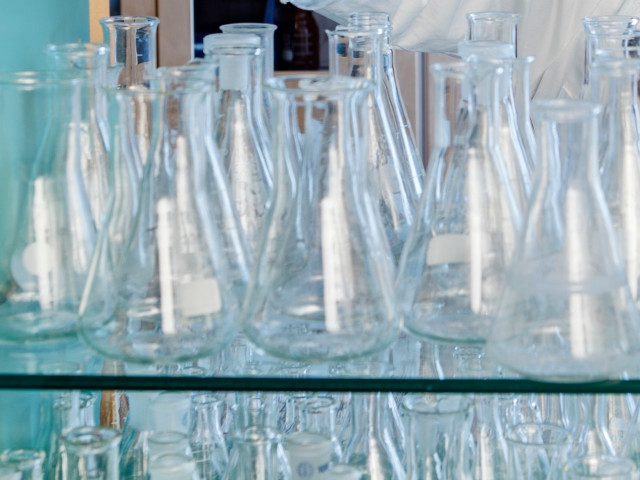- Fotokemins och strålningskemins grunder
- Fotokemi och strålningskemi i fasgränser
- Olika typer av radikaler samt deras reaktivitet
- Radikalers kemiska och fysikaliska egenskaper
- Radikalreaktioner, kinetik och mekanismer
- Produktion av radikaler
- Metoder för studier av radikalreaktioner och karakterisering av radikaler
- Radikaler i biologiska system
- Radikaler i tekniska system
KD2370 Foto-, strålnings- och radikalkemi 7,5 hp

- Fotokemins och strålningskemins grunder
- Fotokemi och strålningskemi i fasgränser
- Olika typer av radikaler samt deras reaktivitet
- Radikalers kemiska och fysikaliska egenskaper
- Radikalreaktioner, kinetik och mekanismer
- Produktion av radikaler
- Metoder för studier av radikalreaktioner och karakterisering av radikaler
- Radikaler i biologiska system
- Radikaler i tekniska system
Information per kursomgång
Välj termin och kursomgång för att se aktuell information och mer om kursen, såsom kursplan, studieperiod och anmälningsinformation.
Information för VT 2026 Start 2026-03-16 programstuderande
- Studielokalisering
KTH Campus
- Varaktighet
- 2026-03-16 - 2026-06-01
- Perioder
VT 2026: P4 (7.5 hp)
- Studietakt
50%
- Anmälningskod
60917
- Undervisningsform
Normal Dagtid
- Undervisningsspråk
Engelska
- Kurs-PM
- Kurs-PM är inte publicerat
- Antal platser
Min: 12
- Målgrupp
- Öppen för alla studenter
- Planerade schemamoduler
- [object Object]
- Schema
Kontakt
Kursplan som PDF
Notera: all information från kursplanen visas i tillgängligt format på denna sida.
Kursplan KD2370 (VT 2025–)Innehåll och lärandemål
Kursinnehåll
Lärandemål
Efter fullgjord kurs ska studenten kunna:
- Beskriva grundläggande fotokemiska och strålningskemiska processer både kvalitativt och kvantitativt, beskriva radikalers egenskaper och reaktivitet samt hur dessa kopplar till radikalernas struktur och
redogöra för radikalers betydelse i tekniska och biologiska system (TEN1). - Planera och utföra experimentella studier av enklare system inom foto-, strålnings och radikalkemi samt utvärdera de experimentella resultaten (LAB1).
- Muntligt redogöra för publicerade forskningsresultat inom en begränsad del av kursens omfattning (PRO1).
Kurslitteratur och förberedelser
Särskild behörighet
Avklarat examensarbete 15hp, 50hp inom kemiteknik eller kemi, 20 hp matematik och 6 hp datorkunskap/programmering. Engelska B/ 6.
Kurslitteratur
Examination och slutförande
Betygsskala
Examination
- PRO1 - Projekt, 1,0 hp, betygsskala: P, F
- TEN1 - Tentamen, 5,5 hp, betygsskala: A, B, C, D, E, FX, F
- LAB1 - Laborationer, 1,0 hp, betygsskala: P, F
Examinator beslutar, baserat på rekommendation från KTH:s handläggare av stöd till studenter med funktionsnedsättning, om eventuell anpassad examination för studenter med dokumenterad, varaktig funktionsnedsättning.
Examinator får medge annan examinationsform vid omexamination av enstaka studenter.
När kurs inte längre ges har student möjlighet att examineras under ytterligare två läsår.
Övriga krav för slutbetyg
Laborationer (LAB1; 1 hp)
Projekt (PRO1; 1 hp)
Tentamen (TEN1; 5,5 hp)
Slutbetyget blir samma som betyget från tentamen.
Examinator
Etiskt förhållningssätt
- Vid grupparbete har alla i gruppen ansvar för gruppens arbete.
- Vid examination ska varje student ärligt redovisa hjälp som erhållits och källor som använts.
- Vid muntlig examination ska varje student kunna redogöra för hela uppgiften och hela lösningen.
Ytterligare information
Kursrum i Canvas
Ges av
Huvudområde
Utbildningsnivå
Övrig information
Kursen har samma innehåll som kurserna KD2100 Radikalkemi.
Endast en av kurserna KD2370 och KD2100 får tas med i examen.